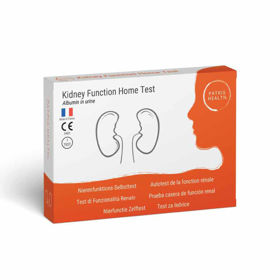Customer question:
Kidney failure... happened to my relative. How can I protect myself? Is there a cure? Anonymous customer.
Pharmacist's answer:
Kidney failure occurs when the kidneys suddenly stop filtering waste products from the blood. When your kidneys lose their ability to filter, dangerous amounts of "waste" and metabolites build up in your body, throwing off your blood chemistry.
Kidney failure means that 85-90% of your kidneys are not working well enough to keep you alive. There is no cure for kidney failure, but it is possible to live a normal life with treatment. Kidney failure is not a death sentence; people with kidney failure live active lives and continue to do the things they enjoy.
Who is at risk of kidney failure?
Kidney failure can affect anyone. However, there is a higher risk of developing kidney failure if:
- you have diabetes
- you have high blood pressure (hypertension)
- you have heart disease
- you have a family history of kidney disease
- you have an abnormal kidney structure
- you are over 60
- You have a long history of taking pain relievers, including over-the-counter products such as non-steroidal anti-inflammatory drugs (NSAIDs)
What are the first warning signs of kidney failure?
People in the early stages of kidney disease often do not experience severe symptoms. Symptoms of chronic kidney disease and kidney failure vary from person to person. If your kidneys are not working correctly, you may notice one or more of the following signs:
- extreme fatigue (exhaustion)
- nausea and vomiting
- confusion or difficulty concentrating
- swelling (edema), especially around the hands, ankles, or face
- more frequent urination
- muscle spasms
- dry or itchy skin
- poor appetite
- food that has a metallic taste
What are the most common causes of kidney failure?
Diabetes and high blood pressure are the most common causes of chronic kidney disease and kidney failure. Other causes of chronic kidney disease that can lead to kidney failure include:
- Polycystic kidney disease: PLB is an inherited condition that causes fluid-filled cysts to grow in your kidneys.
- Glomerular disease: Diseases of the glomeruli affect how well the kidneys filter toxins.
- Lupus is an autoimmune disease that can cause organ damage, joint pain, fever, and skin rashes.
Kidney failure can also develop from an unexpected cause. We speak of acute kidney failure when the kidneys suddenly lose their ability to function. Acute kidney failure can develop within a few hours or days and is often only temporary.
Common causes of acute kidney failure include:
- autoimmune kidney diseases
- specific medicines
- severe dehydration
- obstruction of the urinary tract
- untreated systemic diseases such as heart or liver disease
Interesting reading: Where do the kidneys hurt?












 Facebook
Facebook
 Instagram
Instagram
 info@moja-lekarna.com
info@moja-lekarna.com

